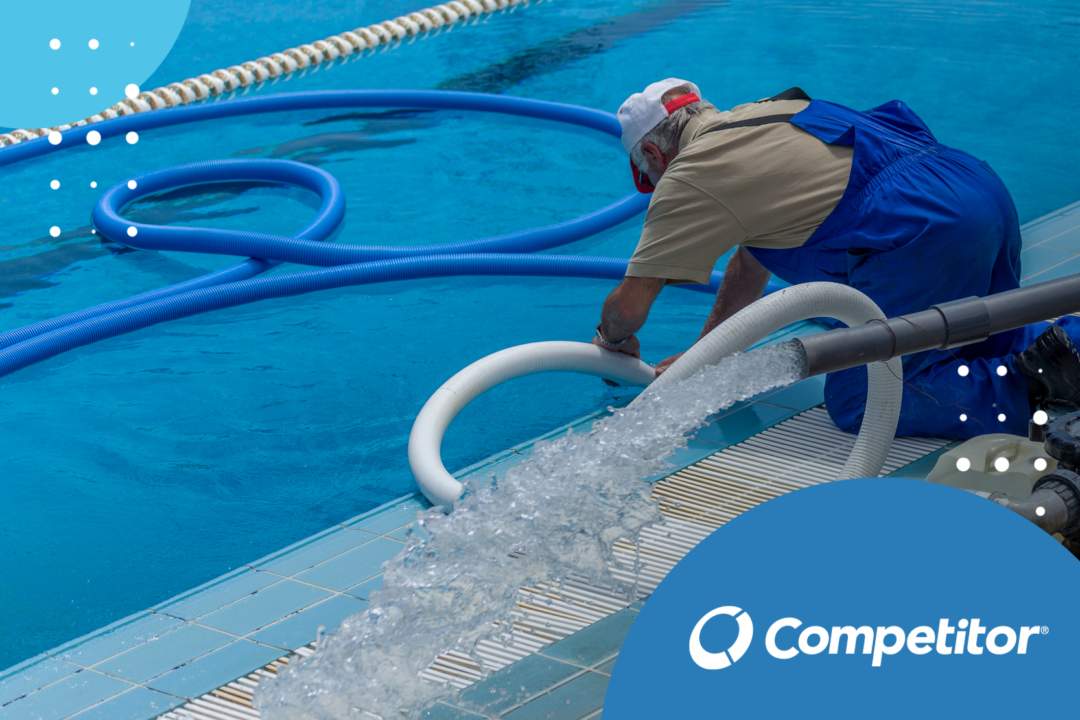Courtesy of Competitor Swim, a SwimSwam Partner Since 2013
Maintaining the perfect pool isn’t just about aesthetics; as any good facility manager knows, a well-run pool facility ensures safety, enjoyment, and optimal performance for competitive swimmers. For facility managers trusted with the care of swimming pools, maintenance extends beyond checking chemicals. It’s about balancing water quality, equipment upkeep, and ensuring that every aspect, even down to the swimming pool lane lines, contributes to a seamless swimming experience.
By exploring our tips and expertise, you can dive deep into the best practices for maintaining a competition-ready pool year-round.
Pool Equipment and Accessories Upkeep
While a lot is involved in pool maintenance, one of the most important aspects, especially for competition swimming pools, is the equipment. Things like swimming pool lane lines, starting blocks, pace clocks, and storage reels all require upkeep, especially if left outside.
Below are some of the key things to consider when trying to extend the lifetime of your pool equipment:
Swimming Pool Covers:
- Utilizing and maintaining covers to minimize debris and heat loss.
- Inspecting covers for tears or damage, repairing or replacing as needed.
Starting Blocks and Diving Platforms:
- Ensuring secure and well-maintained blocks and platforms.
- Regular inspections for stability and safety compliance.
Swimming Pool Lane Lines:
- Adjustment or alignment based on pool usage, competitions, or practice sessions.
- Store lane lines properly when not in use to prevent tangling or damage.
- Avoid dragging lane lines across abrasive surfaces that could cause abrasions or tears.
- Regularly inspect for any signs of wear, tear, or damage along the length of the lines.
Storage Reels:
- Wipe down reels to remove dust, dirt, and moisture buildup.
- Lubricate moving parts to maintain smooth operation.
- Repair or replace damaged components promptly to prevent further issues.
Pace Clocks:
- Replace batteries or rechargeable power sources regularly to ensure uninterrupted functionality.
- Check connections and wiring for any signs of damage or corrosion.
- Cover or protect clocks during off-hours or when not in use to prevent dust accumulation.
Safety Measures and Compliance
As the facility manager, you’re responsible for more than just the upkeep of pool equipment; you’re also in charge of all aspects of pool safety and compliance.
Below are some of the key things to consider when it comes to pool safety and regulations:
Life-Saving Equipment:
- Ensure the availability and proper placement of lifebuoys, safety ropes, and reaching poles around the pool area.
- Regularly inspect and maintain these devices for functionality and accessibility.
Depth Markers and Signage:
- Install clear and visible depth markers along the pool edge and display appropriate signage indicating water depth.
- Ensure signage includes warnings about diving areas, shallow ends, and other safety-related information.
Fencing and Barriers:
- Maintain and regularly inspect perimeter fencing or barriers to prevent unauthorized access to the pool area.
- Ensure gates and latches are in good working condition and are secured when the pool is not in use.
CPR and First Aid Training:
- Provide staff with CPR and first aid training to respond effectively to emergencies.
- Display emergency contact numbers and instructions prominently around the pool area.
Regular Safety Inspections:
- Conduct routine safety inspections to identify hazards, slippery surfaces, or potential risks.
- Address any safety concerns promptly and keep records of inspections and corrective actions taken.
Emergency Preparedness and Drills:
- Conduct regular emergency preparedness drills with staff to practice responses to various scenarios.
- Review and update emergency protocols based on lessons learned from drills or incidents.
Water Quality and Maintenance
While maintaining proper water quality is paramount for any type of swimming pool, it’s especially important for facility managers of competition pools. With swimming pool lane lines and other expensive pool equipment interacting with the water regularly, it’s important to keep the chemicals balanced to reduce wear and tear.
Below are some additional things to consider when it comes to water quality and maintenance:
Regular Testing:
- Conduct frequent water quality tests for pH levels, chlorine or other sanitizers, alkalinity, and calcium hardness.
- Keep records of test results to track trends and make necessary adjustments.
Chemical Balancing:
- Maintaining proper chemical balance ensures effective sanitation and prevents algae or bacterial growth.
- Adjust chemical levels as needed to meet recommended ranges for safe and clean water.
Filtration System Care:
- Clean or backwash filters regularly to remove debris and contaminants.
- Schedule routine filter replacements or cleanings as per manufacturer guidelines.
Skimming and Cleaning:
- Skim the pool surface daily to remove leaves, insects, and other floating debris.
- Vacuum and brush the pool walls and floor regularly to prevent algae buildup.
Shock Treatment and Superchlorination:
- Perform shock treatments periodically to oxidize organic matter and maintain water clarity.
- Superchlorinate to address chloramine buildup and maintain adequate free chlorine levels.
Water Circulation:
- Ensure proper water circulation by running pumps and filters for the recommended duration.
- Adjust circulation patterns to prevent stagnant areas in the pool.
Professional Inspections and Maintenance:
- Schedule regular professional inspections of the pool and its systems by qualified technicians.
- Address any identified issues promptly and follow recommended maintenance schedules.
The Right Swim Equipment Makes All the Difference
For pool owners, the quality of the pool equipment matters! That’s why we’ve designed our swimming pool lane lines to meet the exacting standards of FINA, USA Swimming, NCAA, and NFHS. With Competitor, you can rest assured that your equipment is built to withstand regular wear and tear. Choose from our expertly engineered swim lane lines, pace clocks, and more. Contact us to find the right indoor or outdoor swimming pool equipment.
